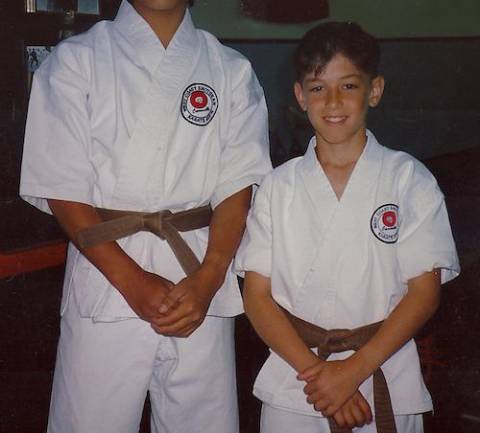Like so many of us, when Adam Lisagor was a kid, he was into karate movies. Naturally, he also learned karate. There was no game console in his parents' house, but there was a computer. So when his sister needed to buy him a gift in 1984, she bought a copy of Jordan Mechner’s Karateka for the Apple ][ from Egghead Software.
“I was playing games, then, but only in the way that any kid was playing games,” he told me.

28 years later, life would come full circle, and Lisagor would find himself on a film set directing a commercial for a Karateka remake through his video production company Sandwich Video.
Games did not follow Lisagor much past Karateka, though he did play Mechner’s Prince of Persia, as well. As did millions of others, he bought a Wii to play the latest Mario games, but that’s about it. Games just weren’t his thing. But he was mesmerized by Karateka, taken by a cinematic flair not present in most other video games.
Lisagor and his friend, screenwriter and frequent Tim Burton collaborator John August were looking for a reason to work on a project together. August was working with Mechner on bringing Karateka to life again, pursuing independent financing and development, rather than working with a publisher.
The first Lisagor heard about the project came through a mysterious t-shirt in the mail with the game’s hero trying to take down a hawk. Anybody who’s played Karateka knows all about that damn hawk. Lisagor was immediately on board, even if he’d completely forgotten the name Jordan Mechner.
“The name was really familiar to me because I’d seen it on, first, my Apple ][ screen and the Mac screen in the early 90s when I was playing Prince of Persia,” he said. “So I knew he was a guy, and he was a legendary game creator. I looked him up on Wikipedia, and, then, things started making sense.”
Besides his personal love of Mechner’s games, Lisagor also harbored a secret fantasy.
“In the back of my mind, it’s always been a fantasy to make a martial arts movie,” he said.
The commercial Lisagor shot with Mechner, which combines the real world with the newly updated character models from the Karateka remake, scratched that itch. Before the commercial came together, though, Mechner invited Lisagor to visit Liquid Entertainment, the studio that was actually building the game. Lisagor has a policy of trying out the products he creates videos for, and a game was no exception to that rule.
Mechner asked Lisagor to sit down and play an early version of the game.
“At the very beginning of the meeting, he said ‘here’s the game, play it.’” said Lisagor. “It was really weird because I’m not comfortable with a game controller at all. I just sat down and started playing. But it was really fun to play. [...] He just watched me play for 15, 20 minutes to see if I could figure it out on my own without a primer or anything.”
He figured it out. Unlike 1999’s Prince of Persia, 2012’s Karteka is not a total reinvention of Karateka’s base mechanics. Anyone familiar with the original will have no trouble sliding back in, even if the hawk still eludes them.
Of course, I had to ask about the biggest point of contention with Karateka, both past and present: pronouncing the game’s name. ka-RA-teh-ka? kare-uh-TAY-ka? Mechner pronounces it the latter, but it should be the former.
“From the first time I met Jordan, which was eight months ago, [and] we started talking about the game, it’s just like nails on a chalkboard to hear him say the name,” he said. “It’s so funny. [laughs] Anybody who ever talks to him about it takes issue with how he says the name, and he always acts like it’s the first time he’s ever heard pronounced differently.”
In the commercial, the Japanese actor featured at the start pronounces it as KA-ra-TEH-kah.
“I love that he’s [Mechner’s] so insistent on that, but he’s a really nice guy,” he said. “He doesn’t get belligerent about it. [laughs] Maybe this is an east coast thing, but you often hear people just owning their mispronunciations of different words. ‘No, that’s just how it’s pronounced, it’s how I say it!’ I remember first hearing someone saying May-rio brothers, and cringing.”
Karateka’s revival was released on Xbox Live Arcade this week, and will be available elsewhere, including iOS, soon. The whole process hasn’t brought Lisagor back into the gaming fold, though he expects that will change soon.
“My career, my livelihood, is all based in this linear, cinematic format, which has a language that’s been developed over the past century or more,” he said. “What I’m looking for is for the medium of cinema and the medium of video games to approach each other in a way that’s more meaningful to me. Partially, it’s out of my own lack of time and resources and curiosity that I haven’t quite found it, but probably it’s because the medium is not quite there yet. [...] Eventually, it is going to be--it’s going to far surpass what cinema ever has become.”